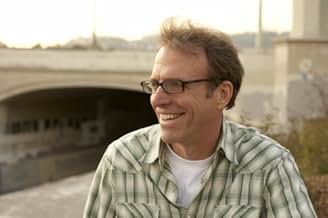Kirby Dick's exposé about the American movie ratings board.Kirby Dick's exposé about the American movie ratings board.Kirby Dick's exposé about the American movie ratings board.
- Director
- Writers
- Stars
- Awards
- 4 wins & 3 nominations total
Clark Baker
- Self - Private Investigator
- (as Clark)
- Director
- Writers
- All cast & crew
- Production, box office & more at IMDbPro
Featured reviews
Ever been curious about the American film rating system? Then Kirby Dick's This Film Is Not Yet Rated is perfect. It does to US censorship what Michael Moore has done to others: it makes everyone look like jackasses, mainly because that's what they really are.
The film explains pretty early on, through South Park-style animation, what kind of rating a movie can get in the USA: G, PG, PG-13, R or NC-17. The last certificate is the most unpleasant one, as a film with that classification won't get a proper distribution. And it's that particular rating that Dick wants to dissect.
This documentary is divided into three sections: the largest one sees various filmmakers (Kimberly Pierce, John Waters, Kevin Smith) revealing the problems they've experienced because of the American ratings board, the MPAA (Motion Picture Association of America). The second section features the director's efforts to uncover the identities of the film raters. You see, the MPAA is supposedly composed of average American parents, doing a fair job. Then how come no one knows who these people are? As the investigation continues, we learn that one board member doesn't even have kids, while several others' offspring are already adults. So what's really going on?
The last part of This Film Is Not Yet Rated focuses on Dick's own censorship trouble, a really interesting version of the movie-within-a-movie gimmick: he sent a rough cut of the documentary to the MPAA, receiving the dreaded NC-17 (since there's some footage coming from other NC-rated films), and so we get to see his frustration as he tries to appeal the controversial decision.
The best part of the film is the first one I mentioned, mainly because we get to know the rules of the game a bit better. Apparently, any kind of "weird sex" is not welcome: oral sex (Boys Don't Cry), threesomes(The Dreamers, American Psycho), gay stuff (Mysterious Skin, Where The Truth Lies), female masturbation (Jersey Girl, a PG-13 movie, almost got an R just because Liv Tyler talks about it)... the list is quite long. Of course, you're better off if your film is endorsed by a major studio. That's why a glimpse of Maria Bello's pubic hair got independent film The Cooler an NC-17, while Sharon Stone doing much more in the audience-baiting Basic Instinct was "appropriate" enough to receive an R. No wonder most filmmakers hate the MPAA! Hell, we even find out that Trey Parker and Matt Stone deliberately put distasteful material in Team America just to make fun of the ratings board.
Another "funny" thing is, the NC-17 is only used against sex. No one ever says anything about on-screen violence. In fact, any movie can have the highest body count ever, and be rated R. If there's no blood, it might even get a PG-13. As people point out, all other countries have the exact opposite attitude, condemning violence rather than sex (I know, from personal experience, that most films rated NC-17 in the US are usually classified "15" or "16" in Europe, while excessive violence tends to lead to an "18").
As someone wisely says in this hilarious, poignant opus, ratings don't really matter. If it's a film a lot of people want to see, no rating in the world can damage it. If it's a film few people want to see, then no rating in the world will save it. That might be true (although I don't necessarily agree: the huge success of The Passion of the Christ was largely due to the rating controversies), but this movie also made me realize that I would definitely not want to be a member of the MPAA. Their criteria are too weird for normal people to understand.
The film explains pretty early on, through South Park-style animation, what kind of rating a movie can get in the USA: G, PG, PG-13, R or NC-17. The last certificate is the most unpleasant one, as a film with that classification won't get a proper distribution. And it's that particular rating that Dick wants to dissect.
This documentary is divided into three sections: the largest one sees various filmmakers (Kimberly Pierce, John Waters, Kevin Smith) revealing the problems they've experienced because of the American ratings board, the MPAA (Motion Picture Association of America). The second section features the director's efforts to uncover the identities of the film raters. You see, the MPAA is supposedly composed of average American parents, doing a fair job. Then how come no one knows who these people are? As the investigation continues, we learn that one board member doesn't even have kids, while several others' offspring are already adults. So what's really going on?
The last part of This Film Is Not Yet Rated focuses on Dick's own censorship trouble, a really interesting version of the movie-within-a-movie gimmick: he sent a rough cut of the documentary to the MPAA, receiving the dreaded NC-17 (since there's some footage coming from other NC-rated films), and so we get to see his frustration as he tries to appeal the controversial decision.
The best part of the film is the first one I mentioned, mainly because we get to know the rules of the game a bit better. Apparently, any kind of "weird sex" is not welcome: oral sex (Boys Don't Cry), threesomes(The Dreamers, American Psycho), gay stuff (Mysterious Skin, Where The Truth Lies), female masturbation (Jersey Girl, a PG-13 movie, almost got an R just because Liv Tyler talks about it)... the list is quite long. Of course, you're better off if your film is endorsed by a major studio. That's why a glimpse of Maria Bello's pubic hair got independent film The Cooler an NC-17, while Sharon Stone doing much more in the audience-baiting Basic Instinct was "appropriate" enough to receive an R. No wonder most filmmakers hate the MPAA! Hell, we even find out that Trey Parker and Matt Stone deliberately put distasteful material in Team America just to make fun of the ratings board.
Another "funny" thing is, the NC-17 is only used against sex. No one ever says anything about on-screen violence. In fact, any movie can have the highest body count ever, and be rated R. If there's no blood, it might even get a PG-13. As people point out, all other countries have the exact opposite attitude, condemning violence rather than sex (I know, from personal experience, that most films rated NC-17 in the US are usually classified "15" or "16" in Europe, while excessive violence tends to lead to an "18").
As someone wisely says in this hilarious, poignant opus, ratings don't really matter. If it's a film a lot of people want to see, no rating in the world can damage it. If it's a film few people want to see, then no rating in the world will save it. That might be true (although I don't necessarily agree: the huge success of The Passion of the Christ was largely due to the rating controversies), but this movie also made me realize that I would definitely not want to be a member of the MPAA. Their criteria are too weird for normal people to understand.
Kirby Dick's expose of the MPAA's ratings process only confirms the suspicion that motion picture ratings are virtually worthless, arbitrarily assigned by an elite panel who purport to have our country's children's best interests at heart, but who seem to think that an exposed breast is more harmful to them than seeing a gunshot to the head.
It's absolutely infuriating that the country's churches have a seat on the ratings boards and a say in what content is or is not suitable for consumption. It's infuriating that an NC-17 rating exists at all (the board is essentially usurping the judgement and decision-making abilities of parents), but doubly infuriating that it's used as a punishment to "encourage" filmmakers to alter their films so that they're more palatable for mainstream film goers. For a while I was kind of sad that home video and the Internet seems to be supplanting movie theatres as the preferred venue for watching films, but now I appreciate the democratizing effect of companies like Netflix and Blockbuster, who have made great filmmakers less reliant on corporate theatre chains to get their films distributed and seen.
As a documentary, "This Film Is Not Yet Rated" is rather disorganized. Dick has good points to make, but their impact is blunted by tangents and off-topic tirades. Dick hires a private detective to track down the identities of the ratings board, and spends far too much of his 96 minutes following the details of that investigation. On the plus side, it's great to see directors and actors like Kimberly Peirce, Maria Bello and John Waters given a venue to vent their frustrations at the ratings practice.
One of the main points Dick makes, and one I heartily agree with, is that the ratings board focuses far more energy on censoring sex in films than they do violence, a point that is unintentionally driven home by none other than the ratings board chairman herself towards the film's climax. Dick asks why his documentary received an NC-17 rating and she cites the sexual content that appears in some of the clips of films that have received NC-17 ratings sprinkled throughout the documentary. She seems to have no problem with some of the very violent content included in clips from some of those very same movies. What an idiot.
Grade: B+
It's absolutely infuriating that the country's churches have a seat on the ratings boards and a say in what content is or is not suitable for consumption. It's infuriating that an NC-17 rating exists at all (the board is essentially usurping the judgement and decision-making abilities of parents), but doubly infuriating that it's used as a punishment to "encourage" filmmakers to alter their films so that they're more palatable for mainstream film goers. For a while I was kind of sad that home video and the Internet seems to be supplanting movie theatres as the preferred venue for watching films, but now I appreciate the democratizing effect of companies like Netflix and Blockbuster, who have made great filmmakers less reliant on corporate theatre chains to get their films distributed and seen.
As a documentary, "This Film Is Not Yet Rated" is rather disorganized. Dick has good points to make, but their impact is blunted by tangents and off-topic tirades. Dick hires a private detective to track down the identities of the ratings board, and spends far too much of his 96 minutes following the details of that investigation. On the plus side, it's great to see directors and actors like Kimberly Peirce, Maria Bello and John Waters given a venue to vent their frustrations at the ratings practice.
One of the main points Dick makes, and one I heartily agree with, is that the ratings board focuses far more energy on censoring sex in films than they do violence, a point that is unintentionally driven home by none other than the ratings board chairman herself towards the film's climax. Dick asks why his documentary received an NC-17 rating and she cites the sexual content that appears in some of the clips of films that have received NC-17 ratings sprinkled throughout the documentary. She seems to have no problem with some of the very violent content included in clips from some of those very same movies. What an idiot.
Grade: B+
Since the Hays Code, filmmakers have had a lot more freedom over the content of their films. However, the MPAA ratings board still does exercise a certain de facto censorship power. Most people do not realize this.
"This Film is not Yet Rated" exposes the arbitrariness, secrecy, and bias of the MPAA ratings board and makes the viewer question why movies receive the ratings they do.
Kirby Dick puts together a nice cross-section of directors and "talking heads" who discuss the MPAA ratings board's biases when it comes to realism, sex, violence, gay themes, and other taboo issues in films.
Dozens of major directors have had problems with the MPAA ratings board - they either received the NC-17 (or the old "X") rating or had to cut their films to meet the requirements of the ratings board. Some examples are: Kubrick, Tarantino, Lynch, Woo, Friedkin, Peckinpah, Aronofsky, and countless others.
This film exposes the fact that the ratings board is made up of people who are given NO criteria and NO training for rating films, so they basically use their own personal (and obviously heavily biased) judgments to decide what rating a particular movie should receive.
This is an important film because so few people realize how movies are rated in the U.S. Even fewer realize how problematic (biased, anti-democratic, non-transparent, not accountable) our system is.
It is also well put together, so it is easier to watch than most documentaries.
I would have liked to have heard more comparisons between the U.S. rating system and others worldwide, something that was only briefly touched upon.
9 out of 10
"This Film is not Yet Rated" exposes the arbitrariness, secrecy, and bias of the MPAA ratings board and makes the viewer question why movies receive the ratings they do.
Kirby Dick puts together a nice cross-section of directors and "talking heads" who discuss the MPAA ratings board's biases when it comes to realism, sex, violence, gay themes, and other taboo issues in films.
Dozens of major directors have had problems with the MPAA ratings board - they either received the NC-17 (or the old "X") rating or had to cut their films to meet the requirements of the ratings board. Some examples are: Kubrick, Tarantino, Lynch, Woo, Friedkin, Peckinpah, Aronofsky, and countless others.
This film exposes the fact that the ratings board is made up of people who are given NO criteria and NO training for rating films, so they basically use their own personal (and obviously heavily biased) judgments to decide what rating a particular movie should receive.
This is an important film because so few people realize how movies are rated in the U.S. Even fewer realize how problematic (biased, anti-democratic, non-transparent, not accountable) our system is.
It is also well put together, so it is easier to watch than most documentaries.
I would have liked to have heard more comparisons between the U.S. rating system and others worldwide, something that was only briefly touched upon.
9 out of 10
The film rating system in this country is governed by a secret panel created by the major film studios more than 35 years ago. Since its inception the MPAA ratings board has functioned as a sort of 'black box' where movies go in one end and a rating comes out the other, with absolutely no transparency or public accountability of the process.
The MPAA rating system is publicly proclaimed to be merely a voluntary industry system that nobody is 'required' to follow. Unfortunately the reality of the movie industry is entirely divorced from these innocuous proclamations. The rating placed on a film largely determines who gets to see it in a theater, and what sort of publicity for the movie will be accepted by television and newspapers. An NC-17 basically guarantees that only the small sliver of the public with access to art house cinemas will ever sit down in a theater to watch the film, and that there will be virtually no way to promote the film to the public.
So, in the real world, the MPAA ratings board wields considerable unchecked power over the film industry. Since the organization is funded and sustained by the major studios, that influence becomes particularly problematic when applied to independent productions. It would be not unlike a small, local merchant having to go to board set up by Wal-Mart and Target to get approval for what he can put out on his shelves.
Kirby Dick approaches this subject with humor, insight, and tenacity. He undertakes to blow the lid off of the black box of the MPAA rating system. In the process he creates a narrative filled with both information and humor. While I will leave his methods as a surprise for the viewer, suffice it say they are both unconventional and effective.
The interspersing of interviews with independent filmmakers who have been forced to do battle with the MPAA to get their movies seen, provides an excellent counterpoint to Dick's quest to expose the star chamber like proceedings of the rating board to the light of day. As well, his side-by-side comparisons of similar films, one receiving an R rating and the other an NC-17, is illustrative of the particular biases present on the ratings board.
If you care deeply about he art of film, This Film Is Not Yet Rated is a must-see. On the other hand if you just want to learn a little something and have a good laugh, this is a good pick for you too.
The MPAA rating system is publicly proclaimed to be merely a voluntary industry system that nobody is 'required' to follow. Unfortunately the reality of the movie industry is entirely divorced from these innocuous proclamations. The rating placed on a film largely determines who gets to see it in a theater, and what sort of publicity for the movie will be accepted by television and newspapers. An NC-17 basically guarantees that only the small sliver of the public with access to art house cinemas will ever sit down in a theater to watch the film, and that there will be virtually no way to promote the film to the public.
So, in the real world, the MPAA ratings board wields considerable unchecked power over the film industry. Since the organization is funded and sustained by the major studios, that influence becomes particularly problematic when applied to independent productions. It would be not unlike a small, local merchant having to go to board set up by Wal-Mart and Target to get approval for what he can put out on his shelves.
Kirby Dick approaches this subject with humor, insight, and tenacity. He undertakes to blow the lid off of the black box of the MPAA rating system. In the process he creates a narrative filled with both information and humor. While I will leave his methods as a surprise for the viewer, suffice it say they are both unconventional and effective.
The interspersing of interviews with independent filmmakers who have been forced to do battle with the MPAA to get their movies seen, provides an excellent counterpoint to Dick's quest to expose the star chamber like proceedings of the rating board to the light of day. As well, his side-by-side comparisons of similar films, one receiving an R rating and the other an NC-17, is illustrative of the particular biases present on the ratings board.
If you care deeply about he art of film, This Film Is Not Yet Rated is a must-see. On the other hand if you just want to learn a little something and have a good laugh, this is a good pick for you too.
Kirby Dick is a filmmaker I wasn't aware of before This Film is Noy Yet Rated, but now he is assuredly on my radar, if only for the determination in pulling off his main idea. Like Super Size Me, this documentary has a near-gimmick to it; Dick hires a private investigator in order to track down the anonymous "parents" who decide why a movie will be rated R over PG-13, and NC-17 instead of R. This even leads- more intriguingly- into the more deceptive group of appellant board members of the MPAA. So on the one hand the filmmaker has this extremely entertaining, guerrilla-style aspect to his film, with a hand-held camera in one moment in a fast-food place that draws attention to him, and detectives who will go to any length to get results. On the other hand he gets great interviews and clips and history about the film industry in the US and the near fascist style of the MPAA in relation to the several (corporite) studios.
As a film buff this film already had my interest long before I saw it. For too long the topic of film ratings have both infuriated and fascinated me. Much of what ends up going on with filmmakers's battles with the MPAA to get their R (and indeed the difference between millions of dollars in grosses) instead of an NC-17 is staggering. That Kirby Dick get such insight out of the insiders (two of which former MPAA people, and two who kept anonymous), filmmakers, business people, and other types within the industry, is a good help to add to the basic argument that there is some inherent problems with the current ratings system in the country. This is accentuated in comparisons between NC-17 and R rated sex scenes from other movies, and clips from films that received the NC-17- or close to it- and the inanities and problems filmmakers have to get their whole vision against people who, of course, are not that creative. There are issues of gay sex in movies, how violence is vs. sex in allowance in ratings, and in the end how big business (and religion) are behind the scenes if not pulling strings then giving complete influence.
All of this as a documentary ends up being pulled fantastically off, as it does at the core what a documentary mostly should- stir up conversation about the topic(s), and at the same time still being entertained to an extent. And Kirby Dick even has a slight Michael Moore tinge to him as he goes full-on after his subjects; one of which reminded me of Moore's own confrontation with Charleton Heston, as Dick puts himself in split screen with animated caricatures of his callers. But Dick also is smart enough to put such subject matter with good doses of humor. I loved the little animated explanation as to what each rating means (including dead orphan and Almodovar jokes), and as he revealed with a near relish the full facts on every member (most shockingly the appellate members). Even if you just have a casual interest in movies it should be worth your while, and especially if you're a parent- and try not to let the NC-17 rating deter you as it's in part just in spite of the mirror put up to the ratings board itself- it's especially prudent to see. It's got both tongue-in-cheek and dead-serious aspirations, and all the while making Jack Valenti look worse and worse. It's biased, to be sure, but for the right reasons.
As a film buff this film already had my interest long before I saw it. For too long the topic of film ratings have both infuriated and fascinated me. Much of what ends up going on with filmmakers's battles with the MPAA to get their R (and indeed the difference between millions of dollars in grosses) instead of an NC-17 is staggering. That Kirby Dick get such insight out of the insiders (two of which former MPAA people, and two who kept anonymous), filmmakers, business people, and other types within the industry, is a good help to add to the basic argument that there is some inherent problems with the current ratings system in the country. This is accentuated in comparisons between NC-17 and R rated sex scenes from other movies, and clips from films that received the NC-17- or close to it- and the inanities and problems filmmakers have to get their whole vision against people who, of course, are not that creative. There are issues of gay sex in movies, how violence is vs. sex in allowance in ratings, and in the end how big business (and religion) are behind the scenes if not pulling strings then giving complete influence.
All of this as a documentary ends up being pulled fantastically off, as it does at the core what a documentary mostly should- stir up conversation about the topic(s), and at the same time still being entertained to an extent. And Kirby Dick even has a slight Michael Moore tinge to him as he goes full-on after his subjects; one of which reminded me of Moore's own confrontation with Charleton Heston, as Dick puts himself in split screen with animated caricatures of his callers. But Dick also is smart enough to put such subject matter with good doses of humor. I loved the little animated explanation as to what each rating means (including dead orphan and Almodovar jokes), and as he revealed with a near relish the full facts on every member (most shockingly the appellate members). Even if you just have a casual interest in movies it should be worth your while, and especially if you're a parent- and try not to let the NC-17 rating deter you as it's in part just in spite of the mirror put up to the ratings board itself- it's especially prudent to see. It's got both tongue-in-cheek and dead-serious aspirations, and all the while making Jack Valenti look worse and worse. It's biased, to be sure, but for the right reasons.
Did you know
- TriviaThe MPAA announced that starting in March of 2007, it will change their policy and allow filmmakers to cite other film's ratings as comparison. The MPAA will also provide information about the demographics of its board.
- Quotes
John Waters: I also heard on 'A Dirty Shame' - and I have no proof of this - that there were doctors involved... and that some of the kinkier terms, like felching and stuff, that they explained to the MPAA what felching meant. Now, I would like to have heard that because felching, no one has ever done felching. Felching is when you fuck someone and suck your own cum out of their asshole. Well, I know a lot of perverts and I don't know anyone who's done that.
- Crazy creditsAt the end credits a count of what the film shows: FUCKS(OR DERIVATIONS OF): 20 MOTHERFUCKERS: 3 HUMPS: 220 NIPPLES: 10 INTERCOURSE WITH PIE: 1 CARTOONS/PUPPETS IN SEXUAL POSITIONS: 15 SPLOSHING: 1 FELCHING: 0
- ConnectionsEdited into This Film Is Not Yet Rated: Deleted Scenes (2009)
- SoundtracksAppeals Members
Written and Performed by Michael S. Patterson (ASCAP)
Courtesy of Absynthe Zelery Music (ASCAP)
- How long is This Film Is Not Yet Rated?Powered by Alexa
Details
- Release date
- Countries of origin
- Language
- Also known as
- Los censores de Hollywood
- Filming locations
- Production companies
- See more company credits at IMDbPro
Box office
- Gross US & Canada
- $306,845
- Opening weekend US & Canada
- $30,664
- Sep 3, 2006
- Gross worldwide
- $347,240
- Runtime
- 1h 38m(98 min)
- Color
- Sound mix
- Aspect ratio
- 1.85 : 1
Contribute to this page
Suggest an edit or add missing content

































